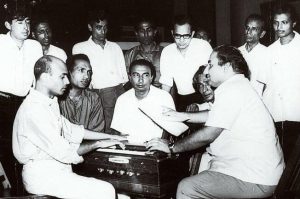Introduction: Khayyam’s Musical Journey Begins
 Khayyam, the renowned composer, born on February 18, 1927, in Rahon city, Punjab, had an inclination towards music from childhood. After a brief stint in the Army during World War II, Khayyam moved to Bombay, laying the foundation for a prolific career. This decision turned out to be a remarkable musical journey that left an indelible mark on the Indian music industry.
Khayyam, the renowned composer, born on February 18, 1927, in Rahon city, Punjab, had an inclination towards music from childhood. After a brief stint in the Army during World War II, Khayyam moved to Bombay, laying the foundation for a prolific career. This decision turned out to be a remarkable musical journey that left an indelible mark on the Indian music industry.
Early Years and Solo Career Development
Starting as an actor in the film, Yehi Hai Zindagi (1947), Khayyam’s musical prowess came to the forefront when he joined forces with music composer Verma Ji to form the Sharmaji-Varmaji team. Together, they composed music for Heer Ranjha (1948). However, after Varmaji’s move to Pakistan during the partition, Khayyam chose to soar as a solo composer, charting his own unique path in Hindi cinema.
The Pivotal Collaboration with Mohammed Rafi
In 1950, Khayyam’s career soared when he composed music for the film Bibi. The ghazal, “Hamari Yaad Aati Toh Hogi” from this film not only became a chartbuster but also forged a lifelong bond between Khayyam and Mohammed Rafi. Subsequently, their partnership endured through several films, with Rafi Sahab’s soulful renditions elevating Khayyam’s compositions to unprecedented heights. Despite composing a comparatively lesser number of songs, Khayyam’s unique, off-beat compositions set him at par with the dominant stalwarts like Shankar Jaikishan, Roshan Lal, and Naushad Ali.
Notable Compositions and Philosophical Depth
Khayyam’s collaboration with Mohammed Rafi produced timeless classics, notably in the film Shola Aur Shabnam (1961). Songs like “Jaane Kya Dhoondhti Rehti Hain Ye Aankhein”, “Jeet Hi Lenge Baazi Hum Tum”, and “Pehle Toh Aankh Milna” showcased both Khayyam’s musical genius and Rafi Sahab’s emotive renditions, carrying inherent philosophical depth that resonated with listeners.
National Award-Winning Achievements and Rafi’s Praise
Khayyam’s brilliance earned him accolades, including National Awards for films like Bazaar (1982), Kabhi Kabhie (1976), Noorie (1979), Razia Sultan (1983), Sawaal (1982), Trishul (1978), and Umrao Jaan (1981). Throughout his illustrious career, he remained effusive in his praise for Mohammed Rafi’s unparalleled contribution to Hindi music, always acknowledging the singer’s immense talent.
Mohammed Rafi’s Enduring Legacy and Humility
Despite his dominance in the Hindi music scene, Rafi Sahab maintained a humble and open-minded approach. Even during the peak of his career, he expressed a desire to sing bhajans under Khayyam’s compositions. This collaboration resulted in a soul-stirring album of devotional songs that showcased the versatility of both maestros, demonstrating Rafi Sahab’s willingness to explore new musical avenues.
Enduring Impact and Compassionate Nature
Khayyam emphasized that Mohammed Rafi’s ever-evolving singing style remained timeless, allowing him to resonate with generations. Rafi Sahab’s dedication, humility, and willingness to contribute to low-budget films for minimal fees showcased his compassionate nature, understanding the struggles of his fellow human beings and supporting the industry.
Conclusion: A Harmonious Partnership That Transcends Time
The harmonious partnership between Khayyam and Mohammed Rafi created a musical legacy that transcends time. Their collaboration, marked by creativity, emotion, and a deep understanding of the human experience, continues to captivate audiences and inspire future generations of musicians. As we delve into their timeless melodies, we celebrate the enduring impact of two legends whose artistry shaped the landscape of Indian music.
In our next article, we will shed light on Rafi Sahab’s controversial Discord with Lata Ji.
~ Balwant S. Wadhwani
